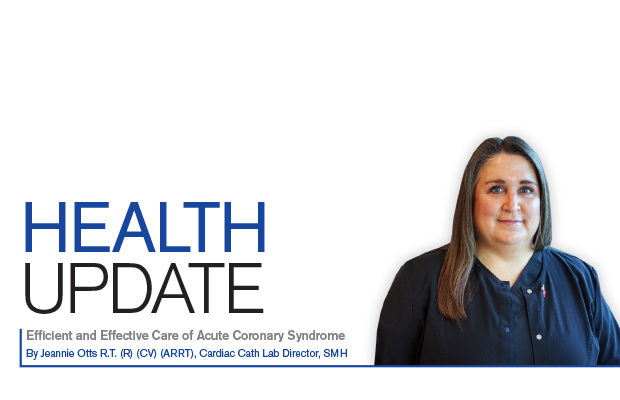Efficient and Effective Care of Acute Coronary Syndrome

Arkansas ranks highest in the nation for heart attack mortality. Heart disease is the number one killer of Arkansans. From 2016–2018, for every 100,000 Arkansans, 80 died of cardiovascular disease. That is why we have made it our mission to make our communities healthy, and to work to provide them with excellent evidence-based care for heart disease.
Saline Health System has provided cardiovascular care for our community for many years. Our Heart & Vascular program has multiple areas within the hospital that focus on testing for and treating heart disease. We provide diagnostic, non-invasive testing and invasive services along with 24/7 call coverage. Heart & Vascular services are provided within a variety of areas throughout the hospital, including the Cardiac Catheterization Laboratory (invasive testing and interventions), Heart Station (non-invasive testing), emergency department, ambulance service, and on-campus cardiology clinics.
In September 2020, we received our Chest Pain Center Accreditation with Percutaneous Coronary Intervention Designation through the American College of Cardiology. The American College of Cardiology Chest Pain Center accreditation is a quality improvement program designed for hospital teams that are focused on providing efficient and effective care for patients with acute coronary syndrome. Acute coronary syndrome refers to symptoms of acute myocardial ischemia, which is when the blood flow to the heart muscle is blocked partially or completely due to buildup of plaque. What this means for Saline County is we are taking heart disease head on, approaching it systematically through guidelines and evidence-based practice.
To take on heart disease we need to make sure we are not only caring for patients within the walls of the hospital but also others elsewhere in our communities. I would like to share our approach to the fight against heart disease.
We have created a solid foundation for our Chest Pain Center by forming a multidisciplinary committee to provide the Center with structure and leadership. The executive leadership, medical staff leadership, physician champions and frontline staff members of the chest pain committee are dedicated to providing clinical processes for low risk chest pain, non-ST elevation myocardial infarctions and ST elevation myocardial infarctions.
Again, community outreach is key in the fight against heart disease. We currently provide Early Heart Attack Care (EHAC) and a hands-only CPR curriculum in a variety of community settings. This includes but is not limited to education on risk factors for cardiovascular disease, signs and symptoms of acute coronary syndrome, early warning signs, and importance of calling 9-1-1. The message we want to get out is that heart attacks, like other diseases, have early signs and symptoms. 50% of patients with heart disease will show such signs, which if recognized can lead to preventive treatment ahead of a heart attack. I would also like to express the importance of not staying home for fear of going to the hospital because of COVID-19. We have taken great measures to provide a safe place for our patients to come for health care.
If you are experiencing a heart attack, the following is what you can expect from a percutaneous coronary intervention designation. We work to intervene and stop the heart attack by opening the blockage with a balloon, thrombectomy or stent placement. Time is muscle when you have a blocked artery, and the goal for reperfusion is a door-to-device time of 90 minutes or less.
If you call 9-1-1, Saline Memorial Ambulance Service, MedTran, is responsible for your pre-hospital care here in Saline County. It has protocols in place to start treatment on the scene, working to provide first-medical-contact-to-device times for heart attacks of 90 minutes or less. You can expect the ambulance crew to perform and ECG and treat your chest pain per protocol as they are transporting you to the hospital. If you are actively having a heart attack, ST-elevation myocardial infarction (STEMI), the ambulance crew will activate a STEMI alert so the cardiologist on call and Cath Lab team can be activated. Once arriving to the emergency department, the cardiac Cath Lab team will take you to the catheterization lab for a diagnostic coronary angiogram with percutaneous intervention to stop the heart attack.
When arriving by private vehicle to the hospital with signs and symptoms of a heart attack, protocols are in place to meet our goal of door-to-device time of 90 minutes or less and save that heart muscle. An RN at the front desk will greet you, take your information, and within 10 minutes perform an ECG. If the ECG should show you are having a heart attack, a STEMI alert will be activated. As above, the cardiologist and Cath Lab teams notified of the STEMI will prepare to take you to the cardiac Cath Lab for a diagnostic coronary angiogram with percutaneous intervention to stop the heart attack.
But having a Chest Pain Center means your care goes beyond the cardiac catheterization lab once the blockage has been opened and the heart attack stops. You will be admitted to our Acute Care areas where we will provide you post-heart attack care. You will have a team of professionals working to give you excellent evidence-based care and education to make sure your heart muscle function is preserved, to get you on the road to healing and lifestyle changes. We are always working to promote healing and prevention of another heart attack.
I leave you with the pledge of Dr. Raymond Bahr, the founder of American College of Cardiology Accreditation Services and leader of the EHAC movement. “I understand that heart attacks have beginnings that may include chest discomfort, shortness of breath, shoulder and/or arm pain, and weakness. These may occur hours or weeks before the actual heart attack. I solemnly swear that if it happens to me or anyone I know, I will call 9-1-1 or activate our Emergency Medical Services.” Please join Saline Health System and thousands of other individuals in taking Dr. Bahr’s pledge. ν









0 comments